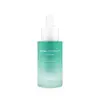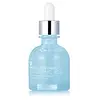What's inside
What's inside
 Key Ingredients
Key Ingredients

 Benefits
Benefits

 Concerns
Concerns

No concerns
 Ingredients Side-by-side
Ingredients Side-by-side

Water
Skin ConditioningButylene Glycol
Humectant1,2-Hexanediol
Skin ConditioningGlycerin
HumectantCentella Asiatica Extract
CleansingCentella Asiatica Root Extract
Skin ConditioningCentella Asiatica Leaf Extract
Skin ConditioningTromethamine
BufferingHydroxyethylcellulose
Emulsion StabilisingPolyglyceryl-10 Oleate
Skin ConditioningAllantoin
Skin ConditioningEthylhexylglycerin
Skin ConditioningCarbomer
Emulsion StabilisingSodium Hyaluronate
HumectantDisodium EDTA
Citric Acid
BufferingTocopherol
AntioxidantHydrolyzed Hyaluronic Acid
HumectantHydrolyzed Sodium Hyaluronate
Skin ConditioningHyaluronic Acid
HumectantHydroxypropyltrimonium Hyaluronate
Potassium Hyaluronate
Skin ConditioningPentylene Glycol
Skin ConditioningMadecassoside
AntioxidantAsiaticoside
AntioxidantAsiatic Acid
Skin ConditioningMadecassic Acid
Skin ConditioningSodium Hyaluronate Crosspolymer
HumectantSodium Acetylated Hyaluronate
HumectantWater, Butylene Glycol, 1,2-Hexanediol, Glycerin, Centella Asiatica Extract, Centella Asiatica Root Extract, Centella Asiatica Leaf Extract, Tromethamine, Hydroxyethylcellulose, Polyglyceryl-10 Oleate, Allantoin, Ethylhexylglycerin, Carbomer, Sodium Hyaluronate, Disodium EDTA, Citric Acid, Tocopherol, Hydrolyzed Hyaluronic Acid, Hydrolyzed Sodium Hyaluronate, Hyaluronic Acid, Hydroxypropyltrimonium Hyaluronate, Potassium Hyaluronate, Pentylene Glycol, Madecassoside, Asiaticoside, Asiatic Acid, Madecassic Acid, Sodium Hyaluronate Crosspolymer, Sodium Acetylated Hyaluronate
Water
Skin ConditioningSodium Hyaluronate
HumectantCopper Tripeptide-1
Skin ConditioningButylene Glycol
HumectantSclerotium Gum
Emulsion StabilisingOctanediol
Ethylhexylglycerin
Skin ConditioningTropolone
Skin ConditioningHydrogenated Polydecene
EmollientCaprylic/Capric Glycerides
EmollientHydrogenated Lecithin
EmulsifyingStearic Acid
CleansingC12-20 Alkyl Glucoside
EmulsifyingC14-22 Alcohols
Emulsion StabilisingGlyceryl Stearate
EmollientPEG-100 Stearate
Cholesteryl Hydroxystearate
EmollientCholesterol
EmollientCeramide NP
Skin ConditioningTriethanolamine
BufferingCarbomer
Emulsion StabilisingBetula Platyphylla Japonica Juice
Skin ConditioningPortulaca Oleracea Extract
Skin ConditioningScutellaria Baicalensis Root Extract
AstringentAstragalus Membranaceus Extract
AntioxidantArnica Montana Flower Extract
MaskingArtemisia Absinthium Extract
Skin ConditioningAchillea Millefolium Extract
CleansingGentiana Lutea Root Extract
Skin ConditioningRubus Idaeus Fruit Extract
AstringentBeta-Glucan
Skin ConditioningAdenosine
Skin ConditioningDisodium EDTA
Water, Sodium Hyaluronate, Copper Tripeptide-1, Butylene Glycol, Sclerotium Gum, Octanediol, Ethylhexylglycerin, Tropolone, Hydrogenated Polydecene, Caprylic/Capric Glycerides, Hydrogenated Lecithin, Stearic Acid, C12-20 Alkyl Glucoside, C14-22 Alcohols, Glyceryl Stearate, PEG-100 Stearate, Cholesteryl Hydroxystearate, Cholesterol, Ceramide NP, Triethanolamine, Carbomer, Betula Platyphylla Japonica Juice, Portulaca Oleracea Extract, Scutellaria Baicalensis Root Extract, Astragalus Membranaceus Extract, Arnica Montana Flower Extract, Artemisia Absinthium Extract, Achillea Millefolium Extract, Gentiana Lutea Root Extract, Rubus Idaeus Fruit Extract, Beta-Glucan, Adenosine, Disodium EDTA
Ingredients Explained
These ingredients are found in both products.
Ingredients higher up in an ingredient list are typically present in a larger amount.
Butylene Glycol (or BG) is used within cosmetic products for a few different reasons:
Overall, Butylene Glycol is a safe and well-rounded ingredient that works well with other ingredients.
Though this ingredient works well with most skin types, some people with sensitive skin may experience a reaction such as allergic rashes, closed comedones, or itchiness.
Learn more about Butylene GlycolCarbomer is a polymer of acrylic acid. Its main role is to create a gel consistency.
A high amount of carbomer can cause pilling or balling up of products. Don't worry, most products contain 1% or less of carbomer.
Disodium EDTA plays a role in making products more stable by aiding other preservatives.
It is a chelating agent, meaning it neutralizes metal ions that may be found in a product.
Disodium EDTA is a salt of edetic acid and is found to be safe in cosmetic ingredients.
Learn more about Disodium EDTAEthylhexylglycerin (we can't pronounce this either) is commonly used as a preservative and skin softener. It is derived from glyceryl.
You might see Ethylhexylglycerin often paired with other preservatives such as phenoxyethanol. Ethylhexylglycerin has been found to increase the effectiveness of these other preservatives.
Sodium Hyaluronate is hyaluronic acid's salt form. It is commonly derived from the sodium salt of hyaluronic acid.
Like hyaluronic acid, it is great at holding water and acts as a humectant. This makes it a great skin hydrating ingredient.
Sodium Hyaluronate is naturally occurring in our bodies and is mostly found in eye fluid and joints.
These are some other common types of Hyaluronic Acid:
Learn more about Sodium HyaluronateWater. It's the most common cosmetic ingredient of all. You'll usually see it at the top of ingredient lists, meaning that it makes up the largest part of the product.
So why is it so popular? Water most often acts as a solvent - this means that it helps dissolve other ingredients into the formulation.
You'll also recognize water as that liquid we all need to stay alive. If you see this, drink a glass of water. Stay hydrated!
Learn more about Water